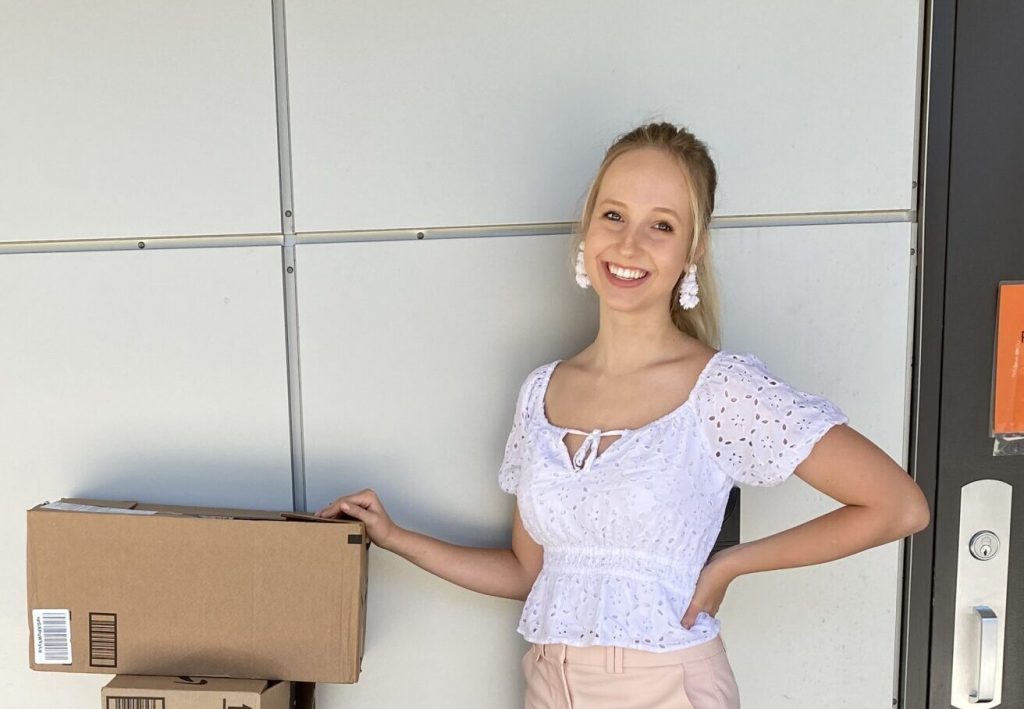Stories
Subscribe NowMarin’s Hope Totes

“Foster Children are not Garbage!”
Imagine being a child entering foster care: you leave your home with little more than the clothes on your back and are handed a plastic garbage bag in which to carry your few possessions. Think about that: 4,000 children/year in Oregon enter foster care and are told on one of the scariest, uncertain, and hopeless days of their lives, “This garbage sack is for you and your stuff.” Marin Gray, a junior at Roseburg High School, felt something needed to change. “Foster children are not garbage,” says Gray. Marin started Hope Totes to provide a tangible symbol of love and dignity for those in foster care; to provide a durable resource that could be transformational, not just transactional. Although she started the project during the COVID pandemic last spring, she wanted to serve an ongoing need that is not just limited to a temporary situation like COVID, so as to leave a legacy project that will generate opportunity for other students to serve when she graduates.
Marin’s Hope Totes initiative exchanges the garbage sacks traditionally given to children entering the foster system for duffel bags, enabling foster children to secure their belongings and enhance their dignity. Marin has raised over $6,000 and donated hundreds of duffels to youth in the overwhelmed foster system. The Interact club at RHS has chosen Hope Totes as their community service project, which will generate about $500 more for the project. Says Marin, “When I learned of the foster care crisis and its impact on communities, I knew I needed to take initiative to be a part of its solution”. Hope Totes is administered through the non-profit Every Child Douglas County, and donations are tax-deductible. Marin also works with Every Child, a non-profit partnering with the Department of Human Services to provide for the emotional and tangible needs of the foster community. She was selected for the role of Youth Advocacy/Outreach Leader with the organization. In this role, she works on practical projects to support foster youth in addition to the Hope Totes initiative. Additionally, she has served in the role of social media manager to regularly create, publish, and organize online content. She speaks on behalf of Every Child across Oregon and helps to host hospitality events for DHS workers and foster parents. Her work has helped to provide resources and support for foster families, workers, and children in foster care, and links Oregon’s foster youth with their community.
To prepare to launch her Hope Totes initiative, Gray met with other non-profit directors, foster parents, and DHS workers to learn what was most needed. Hearing that foster youth are given a garbage sack in which to pack their few belongings, she began a statewide campaign to donate duffel bags to replace the sacks. This entailed creating brochures and fund request letters, meeting with potential donors, contacting duffel suppliers for a pricing discount, and organizing a social media publicity and fundraising event called “The Trashbag Challenge”. Marin packages each duffel bag with individual encouraging notes delivers them and periodically meets with DHS caseworkers for feedback. Caseworkers who have given the duffels to the children awaiting home placement have cited the gift of the duffel as the important first step in building rapport with the foster child. Caseworkers say that the “kiddos’ eyes light up” when they receive the duffels. Lisa Alvarez, a DHS supervisor, says that the Hope Totes donations have particularly had an impact on teens in the foster system, as the duffels are one of the few items donated that are not exclusively geared towards younger children.
Marin’s purpose is strengthened as she witnesses the critical needs of the foster system through her volunteerism. “If a natural disaster left children without a roof over their heads or a caring adult to support them, we would be eager to welcome these children into our homes and to share our resources. The foster system in Oregon is facing a disaster, with 11,000+ children currently in foster care. Every Child rallies communities to partner with families, youth, and workers in Oregon’s foster system. “As I conduct outreach for Every Child throughout the state, I am personally affected by the stories about people’s connections to the foster system. Whether a colleague, friend, or relative has been a foster child, parent, or worker, almost everyone I meet is connected to and impacted by the foster system. Because of this, the success and wellbeing of our community is tied to the success of the foster system,” says Gray.
As the Youth Advocacy/Outreach Leader and the Social Media Manager for ECHO Every Child, Marin has managed the organization’s social media and created content, including writing and producing informative videos about Every Child’s mission, projects, and events. In addition, Marin has spoken about Hope Totes and Every Child to Rotary and Optimist Clubs, the Ford Family Foundation, congressmen, chambers of commerce, and at the Oregon State Fair and the Department of Human Services. Marin has also cared for the community’s foster children by creating Welcome Boxes filled with necessities and toys for foster children awaiting placement, and her Welcome Box video tutorial is used for training volunteers at state and local levels. She recruited seven businesses and non-profits to collect Welcome Box donations and managed and collected donated materials. Many children entering foster care arrive with little more than the clothes on their backs, but through Welcome Boxes, immediately receive necessities such as toothbrushes and toothpaste as well as entertainment items like coloring books and toys. Studies have shown that youth in foster care who have a supportive adult during their transitions into and out of care experience better outcomes in their adult lives, and these boxes serve as a reminder that there is someone who values and supports them.